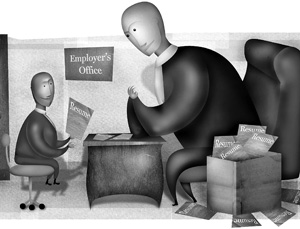 KRT CAMPUS
KRT CAMPUSEmployers are hiring nearly 14 percent more college graduates this year than last, according to a National Association of Colleges and Employers study released in April.
And the numbers are even better at Washington University.
More than half of the University’s Olin School of Business 2006 graduates have reported job offers, up 30 percent from the same time last year. Jim Beirne, associate dean and director of the Weston Career Center at Olin, expects this number to grow to 80 percent by graduation.
The $52,000 median starting salary for Olin graduates is also up 11 percent from last year, a “huge” increase according to Beirne.
The biggest increases are in the service and manufacturing industries, but 60 percent of all polled employers noted at least some growth. Beirne says the two main reasons for the improved job market are a better economy and better recognition of student quality at the University.
“The hiring world is starting to identify Wash. U. as a great source of talent on par with other prestigious institutions,” Beirne said. “Even if the economy tanks, we’ll still see a rise of the Wash. U. profile in the business world.”
Beirne also believes that an undergraduate degree is much more valuable and respected than it used to be. He specifically notes the change in strategy of the investment bank Goldman Sachs, which switched from hiring 75 percent MBAs to 75 percent undergraduates.
“There’s now a substitute of good undergraduates for MBAs,” he said. “They have less grandiose expectations and a better work ethic. MBAs have a higher self-perception.”
The number of recruiters at Olin is also higher, up 19 percent from last year. The largest ones this year include Deloitte & Touche, JP Morgan and Bank of America Securities. Motorola and General Mills are two firms new to the University also seeking undergraduates.
“We have a good balance of consultants, financial institutions and manufacturers,” said Beirne.
Mark Smith, director of career planning and placement at the University Career Center, has also noticed a significant increase in the number of the recruiters who take the time to stop by this campus. The Career Center held its first-ever spring career fair this year which hosted 100 companies, 80 of which had not presented at the University before. The Career Center had to turn some companies down due to lack of room.
Smith has seen a similar trend regarding internships too.
“There are more postings even this late in the year in April and May,” he said.
He agrees with Beirne that the main reasons for these opportunities are a stronger economy and increased targeting of University students.
While the job opportunities may be out there, taking advantage of them is another matter. One of Olin’s weak point is its small size, which discourages recruiters from making the trip to St. Louis. Olin’s entire program contains about 700 students, compared to 1,800 at bigger schools like the University of Pennsylvania.
However, Olin attracts companies with qualities other than size.
“We do viral marketing of the quality of out students,” said Beirne.
Over the summer, the business school plans on revamping the way it markets students to the business world, making it the top priority according to Beirne.
But students must also do their part. Beirne and Smith’s best advice is to visit the career center early and often.
“Get to know us, the people in our offices,” said Beirne. “There’s a direct correlation between the time people spend with us and being successful.”
“The best way is to engage,” said Smith. “Come in and talk to somebody.”
The biggest mistake students make is waiting until their senior year to start searching for jobs, by which point they are far behind.
“The earlier the better,” said Beirne. “If you wait until senior year, you’ve lost your big runway.”
Even when students do start on time, they will have trouble.
“This is a lot of work,” said Beirne. “You’ve got to get doors slammed in your face. There can be 25 ‘no’s before a ‘yes.'”
Beirne expects this hiring trend to continue, but not at the double-digit rates it has this year. Beirne prefers that students stick it out with Weston, though, so that they can learn from experience.
“We have fabulous people,” he said. “If we do our jobs right, students will make mistakes with us. Finding a job is tough. But I’d rather they have the tough time with us so they can be more successful earlier.”